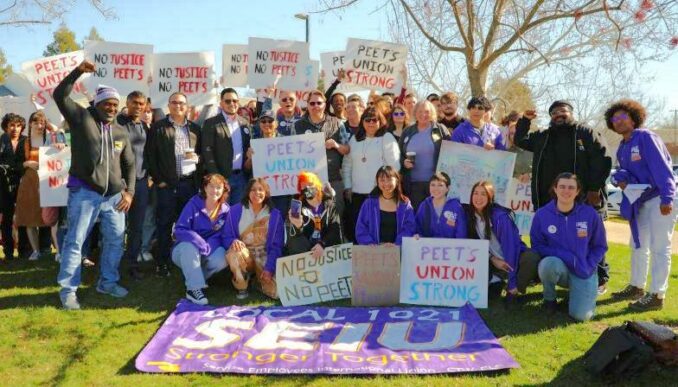On the Picket Line
Peet’s Coffee workers go union
Workers at the Peet’s Coffee in North Davis, California, have joined the movement to unionize coffee shops, following the lead of Starbucks workers in Buffalo, New York. The vote for representation was just one vote shy of unanimous. The North Davis shop is the first unionized Peet’s Coffee in North America. Peet’s has almost 350 stores across the U.S., with over 200 of them located in California — where it first opened in Berkeley.

Peet’s Coffee workers rally for a union, Jan. 28, 2023, North Davis, California. (Photo: SEIU Local 1021)
The North Davis workers became members of Service Employees International Union (SEIU) Local 1021 after a nine-month organizing campaign. Barista Trinity Salazar said of the current labor organizing upsurge sweeping the country: “We all face issues from the top, because corporations want more money and more power over us. Movements create change. It’s small; it’s little, but it has to start somewhere. I hope people see past coffee and see that we have power.” (tinyurl.com/hukmxhzn)
Urban Ore salvage-store workers will hold union election
Workers at Urban Ore, a popular Berkeley, California, salvaged goods store, believe they have a comfortable majority to win a union election. They were successful in getting enough workers to sign union cards to file with the National Labor Relations Board for an election to join the Industrial Workers of the World (IWW).
A Feb. 2 statement of the intent to join the union stated, “We are proud to work at Urban Ore, and we want to make it even better. Urban Ore allows its customers a more sustainable alternative for shopping, and we want it to provide more sustainable jobs.” (localtoday.news)
Workers’ demands include a more stable wage. Currently, the hourly wage is below Berkeley’s minimum wage, but with a fluctuating profit-sharing plan. This unreliable wage structure makes it difficult for workers to cover their housing and other expenses from month to month in gentrified Berkeley. Another worker demand addresses chronic understaffing. The inventory at the store includes very heavy items, and workers risk injury because they are required to lift and transport items without help.
The Urban Ore owners have not made good on a 2017 promise to turn the store into a worker-owned co-op. Workers would welcome that because they want input into how the store could be improved. Urban Ore employee Benno Giammarinaro says workers support such an idea but want to have a voice, through a union, in how a potential cooperative could be structured. For example, management ignored a workers’ petition to rehire a fired worker and has not acted upon their suggestions on how to improve the business.
Penn Medicine doctors are organizing
The over 1,500 resident and fellow physicians at the University of Pennsylvania Hospital System in Philadelphia and surrounding counties are among doctors across the country who want to unionize. Having been denied voluntary recognition by the administration, the UPHS physician house staff have filed with the NLRB for a union representation election. They seek recognition of the Committee of Interns and Residents, a local of SEIU.
Resident physicians and fellows are notoriously overworked, often clocking 80-hour work weeks. These full-fledged doctors, who have completed medical school and have huge debt, are underpaid.
There are difficulties with physician organizing campaigns, because work schedules offer little spare time. Residency and fellowship programs have time limits, usually lasting three to four years. Therefore, hospital corporations have the ability to stall any negotiations, since they know current staff physicians will not be around for the long haul.
At Penn, more senior residents are countering that tactic by engaging the incoming residents and getting them involved in organizing efforts early. They can look to the recent successful physician resident union campaigns at Montefiore Hospital in Bronx, New York, and Stanford Health Care in California.

